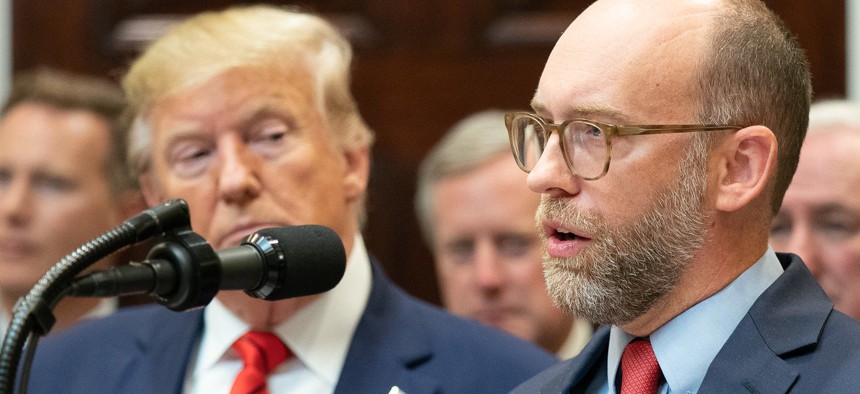
President Donald J. Trump listens to the Office of Management and Budget Director Russ Vought during a White House briefing. Official White House Photo by Shealah Craighead
OMB Reportedly Designates 88% of Its Employees for Schedule F
One former official said the decision will make it harder, not easier, for presidents of both parties to implement their policy agendas in the future.
The leadership of the Office of Management and Budget reportedly plans to reclassify the vast majority of its workforce into a new employment category, removing job protections and effectively making them at-will employees.
Last month, President Trump signed an executive order creating a new Schedule F within the excepted service for employees “in confidential, policy-determining, policy-making and policy-advocating positions” and instructing agencies to identify and transfer competitive service employees that meet that description into the new job classification, an initiative that could strip hundreds of thousands of federal workers of their civil service protections.
The order has been widely derided by stakeholders and experts as an effort to politicize the civil service that would allow the president to purge agencies of employees viewed as disloyal and to instill partisans throughout the federal government. Agencies’ preliminary reviews of their workforces to determine who should be moved into Schedule F are due to the Office of Personnel Management by Jan. 19.
On Saturday, Real Clear Politics reported that OMB Director Russell Vought has determined that 88% of the agency’s workforce, or 425 employees, should be converted to Schedule F, according to an internal memo.
An OMB spokesperson confirmed to Government Executive that Vought has submitted the agency’s preliminary review to OPM and is awaiting approval to move forward with implementation, although they declined to provide a copy of the memo.
Vought told Real Clear Politics that the decision will improve federal workers’ “accountability.”
“Under President Trump’s leadership, we are committed to full accountability of policy-making officials, as Congress intended, and implementing merit principles,” he told the news outlet. “This is another step to make Washington accountable to the American people.”
But Robert Shea, a former associate director at OMB during the George W. Bush administration and a national managing principal for public policy at Grant Thornton, said if anything, the opposite is true.
“I think it erodes a lot of the trust that one should have in the advice that OMB’s spectacular workforce provides,” Shea said. “You know, the OMB staff are charged with doing the analysis, and making recommendations, to the most effective way to implement the president’s policies that are sometimes unpopular. Those folks often have to tell you, ‘You can’t do something you want to do,’ or, ‘The way to get something done that you want to do is harder than you might want it to be.’ If those employees fear retribution for providing tough love analysis, they’re likely to give a second thought before providing it.”
If the Trump administration chooses to fire even a portion of the 425 employees slated to lose their civil service protections, the damage to the ability of presidents of both parties to implement their policy agendas could be vast, Shea said.
“Education, national security, housing and public health, these folks have been helping to oversee the administration of these organizations and development of policy in these important areas, and if they are somehow removed . . . you would certainly lose that institutional expertise,” he said. “I think you’ll see an acceleration in the proposal of policies likely to be ineffective. Policies will be proposed that are likely to be met with not only resistance among stakeholders in Congress, but also in the courts. They will be inconsistent with current law and therefore challenged in the courts, and that will put inordinate delays in the implementation of a president’s policies.”
A wide array of federal employee groups, good government experts and other stakeholders continued their plea for Congress to step in and block the executive order from being implemented. A coalition of groups, including the Partnership for Public Service, the Volcker Alliance, the Senior Executives Association and the National Active and Retired Federal Employees Association, sent lawmakers a letter last week urging them to include language in their next appropriations package to nullify the executive order.
“Our nonpartisan civil service has served as a model for other countries for more than a century,” they wrote. “Since the passage of the Pendleton Act of 1883, civil servants have been hired based on their qualifications, and have been protected from removal based on political affiliation. These protections do not exist for the sake of the civil servants themselves, but rather to ensure the government delivers services insulated from undue political influence.”
The executive order has been particularly harmful in light of the presidential transition, the groups wrote. Trump and his lieutenants could remove employees responsible for key government services just ahead of President-elect Biden’s inauguration, or they could hire a cadre of unqualified partisans to sabotage the new president’s administration.
“The need for Congress to act is urgent, especially as we are in the midst of a transition,” they wrote. “Failing to act will set a dangerous precedent, signaling congressional indifference to a substantial expansion of executive power . . . If Congress remains silent, it indicates acceptance of not just this [executive order], but of future administrative actions to dismantle the legislative framework supporting a nonpartisan civil service.”







